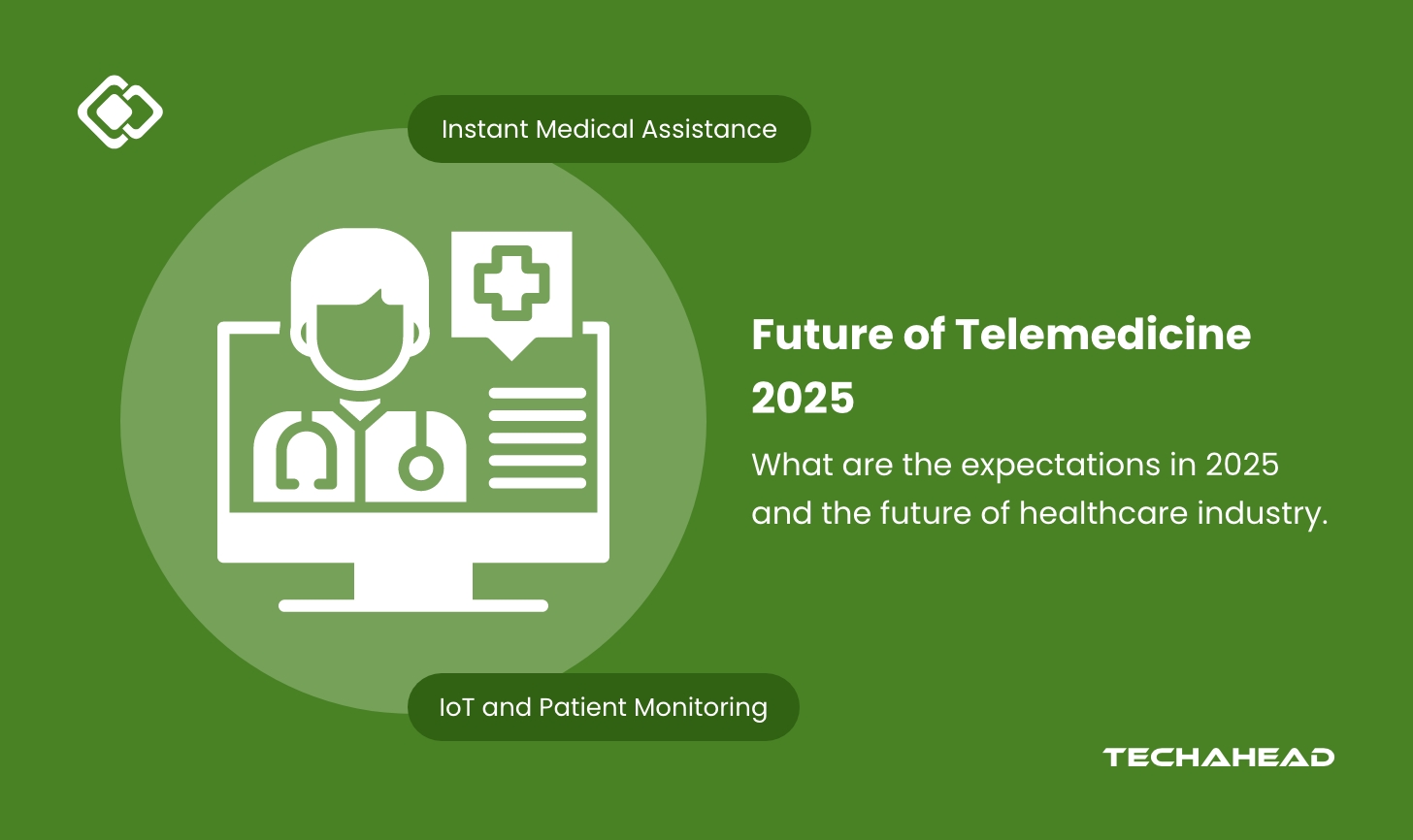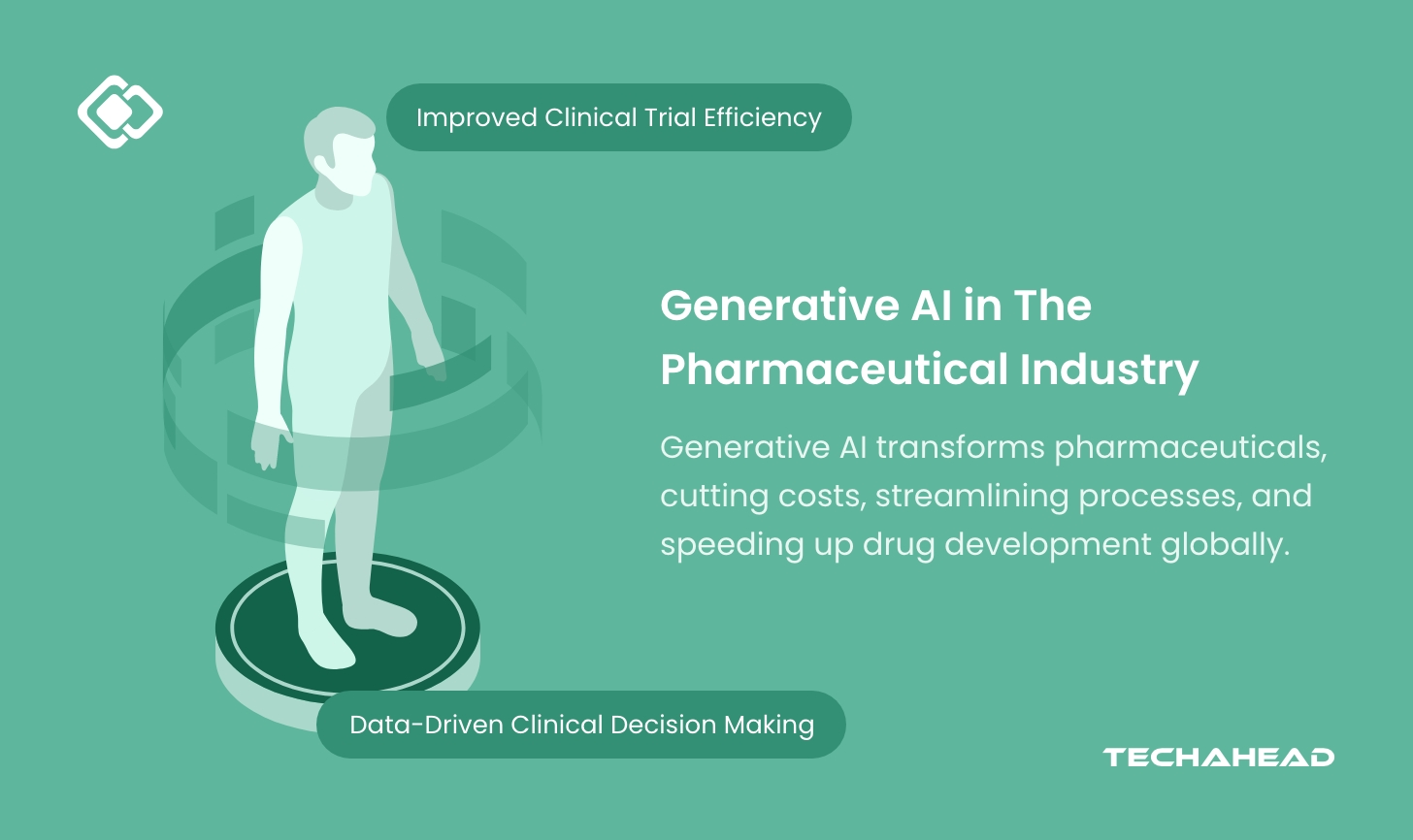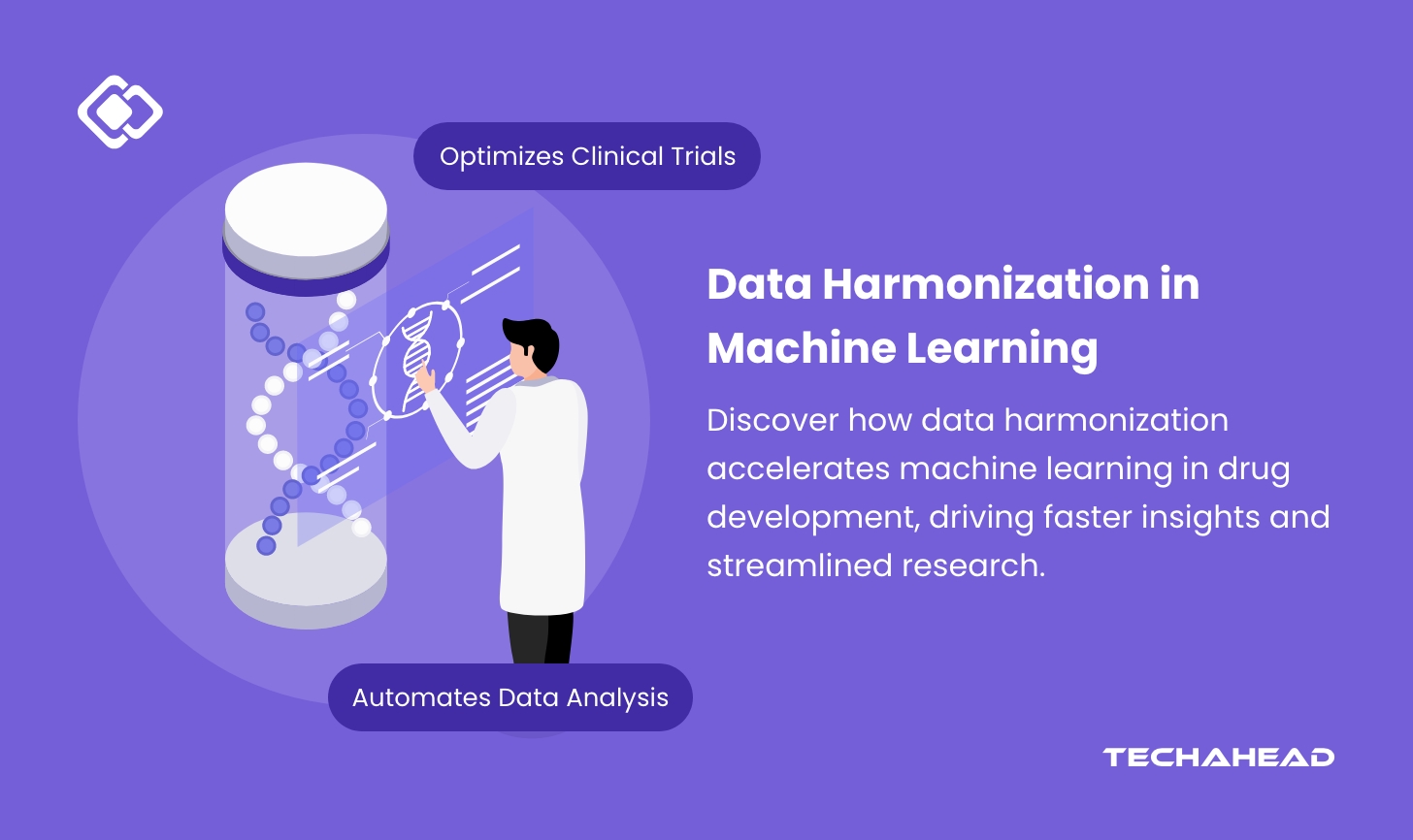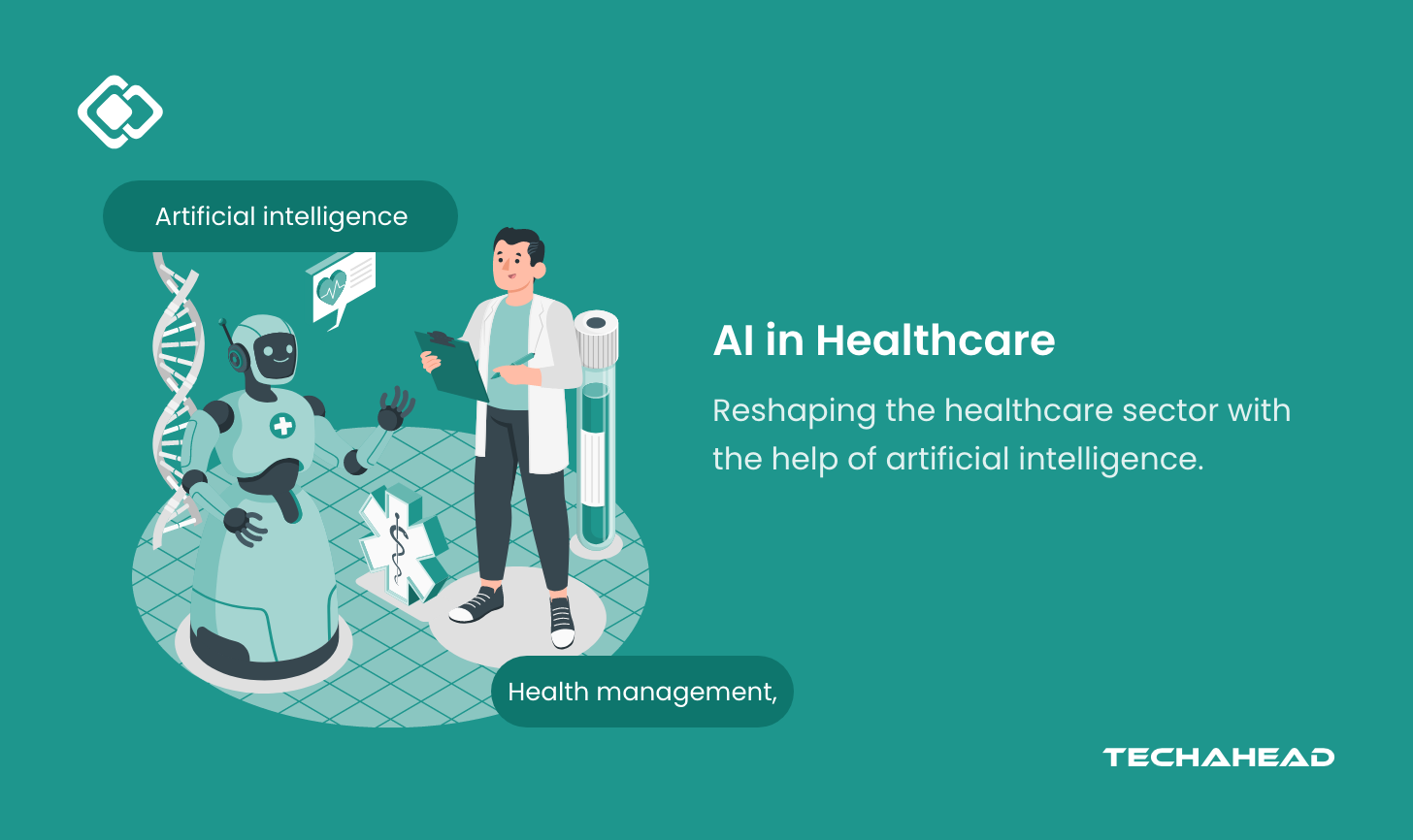
The healthcare sector has seen significant investment from both private and public entities, fueling rapid AI growth and innovation. In the near future, AI-driven advancements will transform diagnostic precision, treatment planning, and population health management, while alleviating administrative burdens. This technology offers personalized care, enhances disease prediction, and streamlines prevention strategies.
According to Markets and Markets, the global AI in healthcare market is expected to surge from $20.9 billion in 2024 to an astounding $148.4 billion by 2029, reflecting a CAGR of 48.1%.
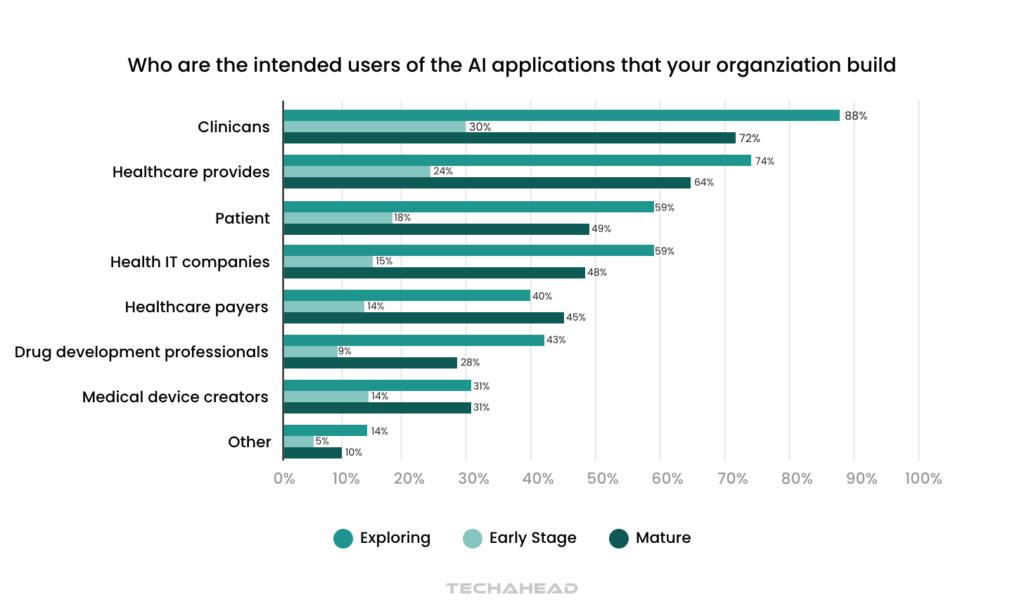
(Source: Statista)
AI’s impact in healthcare extends to crucial areas where speed, accuracy, and efficiency are paramount. With capabilities in machine learning, natural language processing, context-aware computing, and computer vision, AI stands to revolutionize healthcare delivery. Let’s explore how AI’s evolving applications are reshaping the industry.
Reasons to Integrate AI in Healthcare
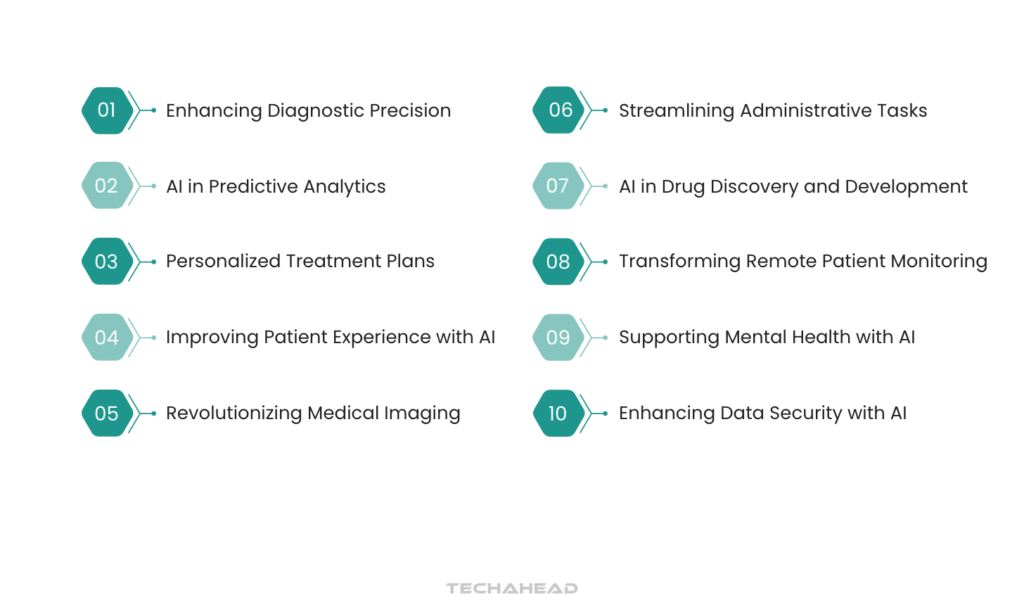
Enhancing Diagnostic Precision
The power of AI-powered diagnostics creates a more accurate, and accessible diagnostic accuracy by identifying patterns and anomalies beyond human perception. Advanced machine learning algorithms analyze vast datasets from radiology, pathology, and genomics. This analysis enables early disease detection, which is critical in conditions like cancer. AI-driven diagnostic tools can assist radiologists in identifying even minute anomalies in medical imaging, often leading to earlier and more accurate diagnoses.
Example: AI in Radiology
For instance, AI tools in radiology scan images to detect early-stage tumors. They detect subtle details that human eyes might miss. By automating these processes, healthcare providers can offer timely treatments and potentially improve survival rates.
AI in Predictive Analytics
AI algorithms analyze historical and real-time patient data to predict potential health risks. Predictive analytics aids doctors in proactively managing patient health. By assessing risk factors, AI can suggest preventive actions before symptoms appear.
Example: Chronic Disease Management
AI helps manage chronic diseases, such as diabetes and heart disease, by predicting complications. For example, AI systems can monitor vital signs and recommend lifestyle changes to prevent worsening conditions. This proactive approach transforms healthcare from reactive to preventive, improving patient well-being.
Personalized Treatment Plans
AI creates tailored treatment plans by analyzing patient-specific data, including genetic profiles and medical history. Personalized medicine ensures treatments are more effective and side effects are minimized.
Example: Cancer Treatment
For cancer treatment, AI can suggest the most effective chemotherapy based on a patient’s unique genetic makeup. This personalized approach increases treatment success rates while reducing unnecessary side effects. Precision in treatment is invaluable, especially in complex diseases like cancer.
Improving Patient Experience with AI
AI improves patient experience by streamlining communication. Chatbots and virtual health assistants offer instant responses to patient inquiries, reducing wait times. They provide accurate answers about medications, appointments, and preventive care.
Example: AI-Powered Virtual Health Assistants
Virtual health assistants guide patients through medication routines, track symptoms, and remind them of follow-ups. This consistent interaction ensures patients remain engaged with their care plans, reducing the risk of non-compliance and supporting better outcomes.
Revolutionizing Medical Imaging
Medical imaging benefits immensely from AI. AI algorithms analyze complex scans like MRIs, CT scans, and X-rays with remarkable accuracy. This technology saves time and increases diagnostic reliability by identifying signs of disease invisible to traditional methods.
Example: Faster, More Accurate Imaging in Emergency Care
In emergency care, AI-driven imaging tools can scan a patient’s brain for signs of stroke or hemorrhage, reducing diagnosis time. Rapid and accurate assessments are critical in emergencies, as they significantly influence patient survival and recovery rates.
Streamlining Administrative Tasks
Administrative tasks consume significant time for healthcare staff. AI simplifies routine processes, like appointment scheduling, billing, and record management. This automation frees medical professionals to focus on patient care rather than paperwork.
Example: AI in Patient Record Management
Natural language processing (NLP) enables AI systems to handle patient records more efficiently. These systems extract and summarize relevant information from medical records, providing healthcare professionals quick access to essential data.
AI in Drug Discovery and Development
AI accelerates drug discovery by analyzing biological and chemical data. Algorithms identify potential drug candidates, predict their interactions, and assess effectiveness, speeding up research phases that traditionally took years.
Example: Vaccine Development
The speed of AI-driven analysis has allowed scientists to bring vaccines to market faster than ever before.
Transforming Remote Patient Monitoring
AI enables remote patient monitoring by tracking health data through wearable devices. These devices send data directly to healthcare providers, allowing continuous monitoring without hospital visits.
Example: Wearable Health Tech
Wearables equipped with AI algorithms monitor heart rate, sleep patterns, and physical activity. This real-time data helps doctors manage conditions remotely, reducing hospital readmissions and improving patient quality of life.
Supporting Mental Health with AI
AI is revolutionizing mental health care by tracking mood patterns and providing therapy recommendations. Chatbots and mobile apps equipped with AI offer cognitive behavioral therapy, emotional support, and mindfulness exercises.
Example: AI-Powered Therapy Bots
AI-powered mental health apps like Woebot use machine learning to provide real-time support for individuals facing anxiety or depression. These tools make mental health support accessible and reduce stigma by providing anonymous assistance.
Enhancing Data Security with AI
With increasing cyber threats, AI plays a critical role in protecting healthcare data. AI-driven security systems detect unusual activity patterns and prevent data breaches, safeguarding sensitive patient information.
Example: Machine Learning for Threat Detection
AI uses machine learning to analyze data access patterns, instantly flagging anomalies that might indicate a security threat. This proactive approach to security is essential in healthcare, where data privacy is paramount.
Why is AI Adoption in Healthcare Critical?
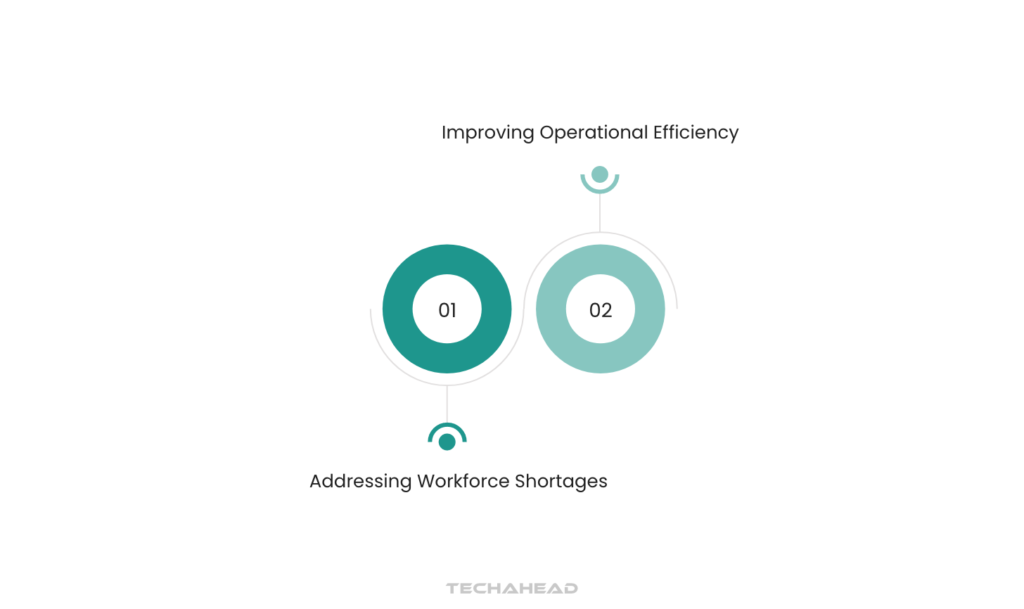
Addressing Workforce Shortages
AI solutions address workforce shortages by automating repetitive tasks. This support allows healthcare workers to focus on patient care and manage growing patient volumes effectively.
Improving Operational Efficiency
AI improves operational efficiency by reducing redundancies and optimizing workflows. By minimizing bottlenecks, hospitals and clinics enhance productivity, leading to faster, more efficient patient service.
Challenges and Considerations for AI in Healthcare
Ethical Concerns and Data Privacy
AI adoption must prioritize data privacy and ethical considerations. Patient data is sensitive, and improper handling could lead to breaches. Ensuring transparent algorithms and patient consent is essential.
Overcoming Technical and Regulatory Barriers
Healthcare AI faces technical challenges, like algorithm transparency and data integration. Regulatory compliance, such as HIPAA and GDPR, requires careful implementation to ensure patient data is secure.
Benefits of AI Integration in Healthcare
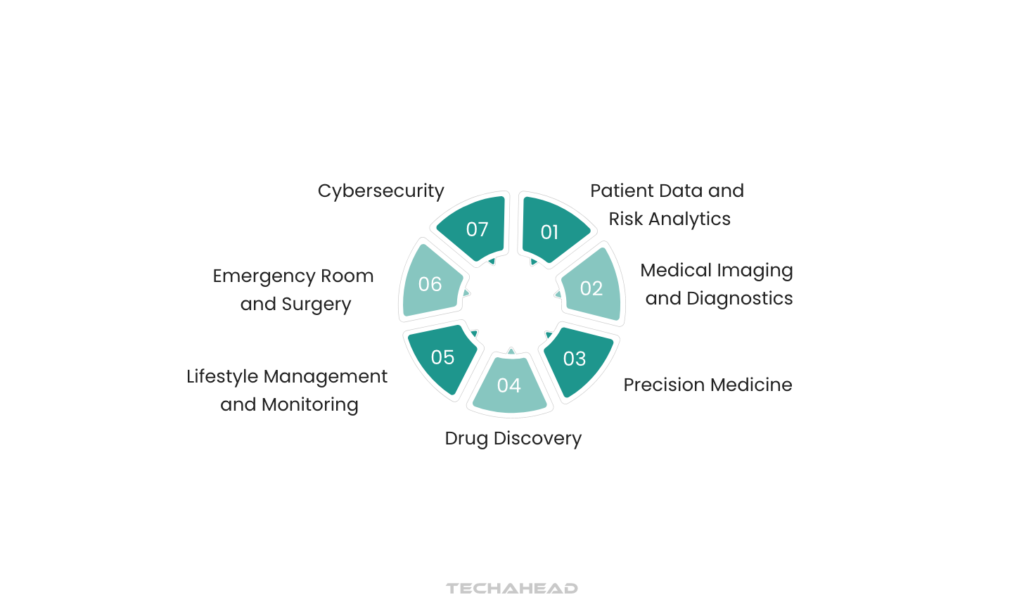
Patient Data and Risk Analytics
In healthcare, every interaction is the core drive of people. Patients and providers leading the charge in information exchange to guide effective care. Often, patients might overlook crucial details about their health, while providers may miss certain complexities in a patient’s case that could impact care planning. This is where artificial intelligence plays a transformative role, refining processes to bolster service-centered practices.
AI seamlessly integrates into healthcare workflows—spanning outpatient and appointment management to approvals, consultations, billing, and claims. This digital enhancement delivers a tailored, streamlined experience, sparing patients and families long waiting times. Patients benefit from efficient, scheduled check-ins, arriving only at their designated time, receiving tests, and leaving promptly. Furthermore, an AI-driven chatbot can provide preliminary symptom checks, such as identifying flu-like signs, and direct patients to the appropriate specialist for precise care.
With all data encrypted and securely processed within interconnected systems, patients no longer need to carry physical records or prescriptions. Healthcare providers can conveniently access patients digital history on tablets or computers before appointments. They can even consult other specialists remotely, collaborating on complex cases to devise the most effective treatment plan.
Medical Imaging and Diagnostics
Radiology today faces critical challenges, including a global shortage of radiologists, an aging population, and rising demands for diagnostic services. These pressures reduce the time radiologists have to examine each scan, leading to mounting stress and burnout. This strain on radiologists negatively impacts departmental productivity and reduces the quality of patient care.
Artificial intelligence (AI) offers promising solutions to alleviate these challenges in radiology. By leveraging machine learning, deep learning, and reinforcement learning, AI can reveal hidden patterns in diagnostic data. These capabilities enable faster disease detection and allow radiologists to create more precise treatment plans.
AI’s impact extends across various imaging modalities, including MRI, CT, and PET. Each modality provides unique insights, from structural and morphological data to physiological functions, enhancing diagnostic accuracy and treatment outcomes.
Precision Medicine
Precision medicine, an emerging field, focuses on tailoring healthcare based on individual genetics, lifestyle, and environment. Apps like Fitbit and doctor-recommended tools enable continuous health monitoring by tracking metrics like heart rate. Diet, and activity, helping users adopt healthier habits.
With wearable devices generating extensive data, advanced AI algorithms now analyze these details, linking factors like genetics, epigenetics, and microbiomes to chronic disease patterns. These insights empower healthcare providers to design personalized prevention and treatment plans. Through AI-driven analysis, precision medicine offers a proactive approach to chronic disease management, paving the way for highly customized, effective healthcare solutions.
Drug Discovery
AI’s impact on biotech is profound, enhancing early-stage drug development success rates and reducing costs by enabling early detection and treatment of high-risk patients. AI-powered drug discovery overcomes traditional R&D limitations, improving success rates and accelerating development. These advancements drive substantial value, offering faster, more affordable drug discovery processes that ultimately reshape therapeutic approaches.
Lifestyle Management and Monitoring
AI-enabled lifestyle management tools are transforming patient monitoring, especially when healthcare professionals aren’t physically present. These applications, like AICure, utilize advanced technology such as smartphone cameras and real-time data analysis to monitor patients’ behaviors closely.
With AI’s capabilities in facial recognition and health tracking, these tools ensure that patients are taking medications correctly, enhancing treatment adherence and preventing complications due to missed doses. AI’s integration with lifestyle applications also enables personalized health tracking, adjusting alerts and reminders based on each patient’s habits, which ultimately optimizes healthcare outcomes and supports independent patient management.
Emergency Room and Surgery
AI technology is revolutionizing surgical robotics, bringing exceptional precision, control, and flexibility to operations. Robot-assisted surgeries now allow surgeons to conduct complex procedures with minimal risk of error, making each surgery safer and more effective. These AI-driven robots learn from actual surgical records, enabling them to refine techniques and improve patient outcomes continually.
In emergency rooms, AI predictive models can assess trends to predict high-demand times, enabling hospitals to allocate resources proactively. Additionally, robotics in healthcare has expanded to areas like automated supply chain management, disinfection, and rapid inventory checks, giving staff more time to focus on patient care while improving operational efficiency.
Cybersecurity
AI plays a critical role in cybersecurity, protecting sensitive medical data that’s increasingly at risk. Advanced AI algorithms can differentiate between normal network activity and potential cyber threats, catching malicious activities early on.
Since healthcare data is a prime target for cybercriminals, AI systems provide a robust defense, identifying, neutralizing, and defending against security breaches. Beyond traditional defenses, AI’s ability to analyze vast data in real time allows it to spot unusual patterns that would otherwise go undetected. As AI continues advancing, it ensures that healthcare systems remain secure, enabling them to harness digital advancements without compromising patient privacy or data integrity.
Conclusion
Artificial intelligence is reshaping healthcare, enabling professionals to elevate diagnostic accuracy, streamline administrative burdens, and enhance patient care. The potential of AI in healthcare is immense. It supports clinicians by analyzing medical images with unprecedented precision, identifying early signs of complex diseases, and predicting health outcomes based on historical data patterns. This predictive capability means that AI not only improves current treatments but also aids in preventing diseases before they progress.
AI’s value doesn’t end with diagnostics. In operational tasks, AI solutions automate repetitive processes like patient data entry and scheduling, reducing human error and allowing healthcare staff to focus on direct patient care. The integration of AI technology is setting new benchmarks for operational efficiency and quality of care across hospitals and clinics worldwide.
AI’s role in healthcare is transformative and enduring, paving the way for more precise, efficient, and personalized medical care that meets the unique needs of each patient.
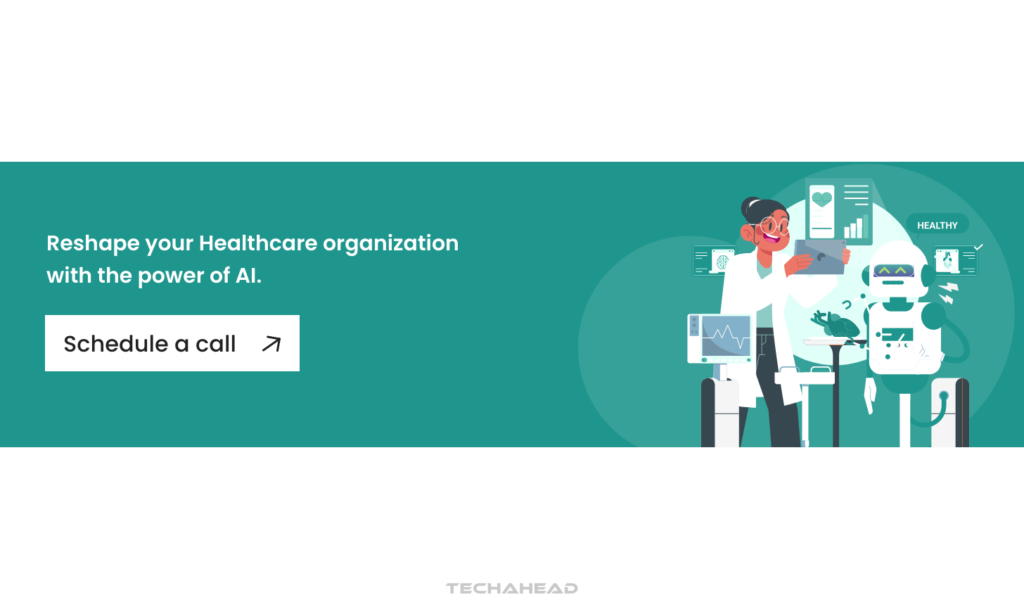
FAQs
AI-powered healthcare apps span a range of categories: telemedicine, remote patient monitoring, predictive health analytics, advanced machine learning, and more. Developing a feature-rich AI healthcare app demands consideration of factors like complex functionalities, platform choice, and target user demographics.
Typically, the cost to build an AI-driven healthcare app falls between $100,000 and $800,000, depending on specific features and project scope. The final price may vary based on unique requirements, integration levels, and intended scale.
Implementing AI in healthcare requires adherence to key ethical principles, including patient data privacy, transparent AI processes, informed consent, and human oversight. Bias mitigation, continual system evaluation, and fostering public trust are also critical. Balancing AI’s benefits with ethical integrity ensures fair, secure, and accessible care.
AI offers distinct advantages in healthcare, enabling businesses to stand out, drive down operational costs, and optimize efficiency. Importantly, AI-powered healthcare solutions can significantly elevate patient outcomes, creating a competitive edge and positioning organizations as leaders in digital healthcare transformation.

